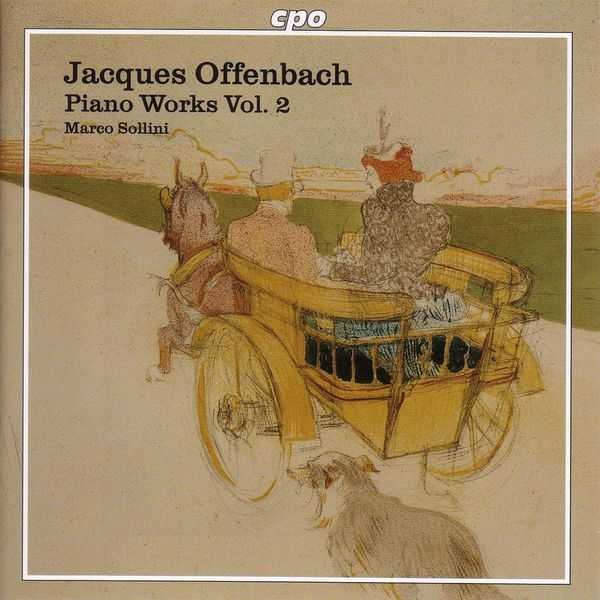
Composer: Jacques Offenbach
Performer: Marco Sollini
Format: FLAC (tracks)
Label: CPO
Catalogue: 7771612
Release: 2006
Size: 218 MB
Recovery: +3%
Scan: cover
01. Abendblätter
02. Schueler-Polka
03. Les Boules de Neige
04. Le Fleuve d’or
05. Le Postillon
06. Jacqueline
07. Polka du mendiant
08. Les Contes de la Reine de Navarre
09. Souvenirs de Londres
10. Herminien-Walzer
11. Madeleine
12. The Celebrated Polka Dance
13. Les Belles Americaines
14. Burlesque Polka
15. Valse composee au chateau du Val le 9 aout 1845
16. Galop infernal (Arr. M. Sollini)
The instrumental works of opera composers of the nineteenth century are almost without exception minor curiosities, and these piano works of Jacques Offenbach follow the pattern. Offenbach is said to have been quite a proficient cellist but to have been largely untutored on the piano, although he apparently had good instincts as a rehearsal accompanist, and indeed these small dance pieces — actual waltzes and polkas rather than the concert waltzes of Chopin — do not challenge the pianist to any great extent. The pianist’s right hand is largely occupied with the melody line alone, and the textural contrasts that set off the multiple strains of the longer pieces are simple ones. The music is formally simple as well, with a slow introduction invariably leading directly into one or more melodies in the prescribed dance rhythm, amplified by a strict repetition scheme. The dances don’t have the up-to-the-minute quality that gives Offenbach’s vocal music its zing; waltzes and polkas, and even a ländler, of a slightly old-fashioned cast are preferred to the driving galop, which is represented only by Le Postillon, track 5, and by a concluding arrangement by pianist Marco Sollini of the Galop infernal, containing the famous can-can tune. The energy level rises considerably with that selection, in which Sollini writes himself more difficult material. Elsewhere the pianist seems too restrained for music that was in some cases written for tours like the one Offenbach undertook to America for the country’s centennial; not only Les belles américaines but also several other works date from this period, and they cry out for a more dramatic approach. Offenbach’s gift for memorable melody is certainly in evidence here, but the music is really for hardcore admirers of this composer.